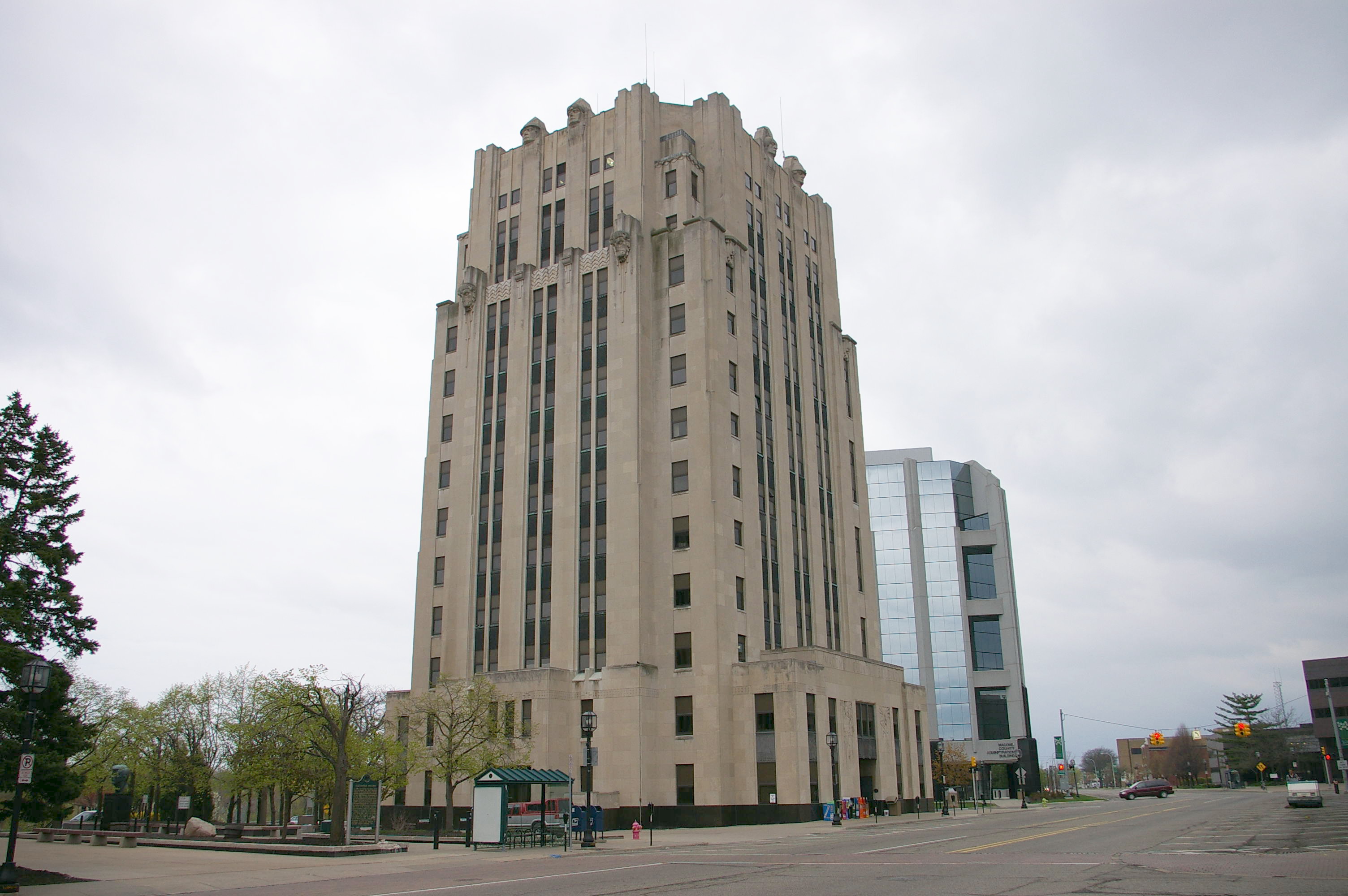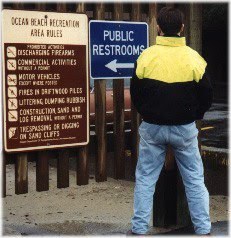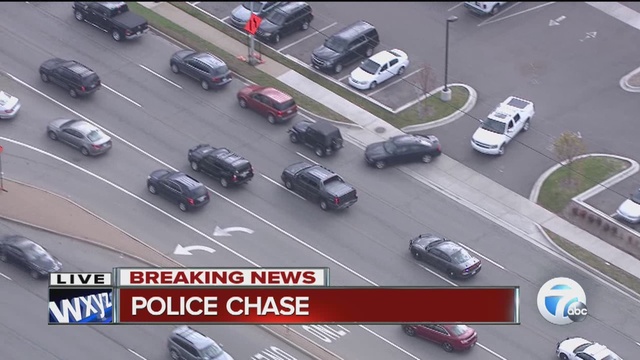MAP OF MACOMB COUNTY DISTRICT COURTS
In 2019, Over 8,000 crimes reported in the cities of Eastpointe, Fraser and Roseville
Eastpointe and Roseville Courts: Bulging Criminal, Drunk Driving and Traffic Dockets
The 38th District Court (known as the Eastpointe Court) and the 39th District Court (known as the Roseville Court), are neighboring district courts in the southeastern part of Macomb County. The 39th District Court in Roseville has jurisdiction over the cities of Roseville and Fraser. Districting is based upon several factors which include density and traffic. As the above map illustrates, these districts are relatively small in relation to other districts in Macomb County. Eastpointe and Roseville cover a combined geographic area of approximately 25 square miles, compared to the 42-1 District in Romeo which encompasses an area of 180 square miles and other cities and townships.
- 38th District Court is located at 16101 Nine Mile, Eastpointe, Michigan 48021. Serviced by 1 Judge with jurisdiction for the City of Eastpointe.
- 39th District Court is located at 29733 Gratiot Avenue, Roseville, Michigan 48066. Serviced by 3 Judges with jurisdiction for the City of Roseville and the City of Fraser.
The Eastpointe Police, Roseville Police and Fraser Police provide law enforcement services to the areas covered by the 38th and 39th District Courts.
- Gratiot Avenue runs through both districts and is patrolled by both the Eastpointe and Roseville Police.
- A stretch of I-94 and I-696 in Roseville are the responsibility of the Michigan State Police.
- 8 Mile Road: The Eastpointe Police and Detroit Police monitor this shared border.
- The Fraser Police monitor activity East of Hayes from 13 Mile Road to 15 Mile Road.
All of the above mentioned roads and expressways generate a considerable mixture of local, commuting, retail and connecting traffic.
The information in this publication is based upon the experience of our Eastpointe and Roseville criminal defense lawyers.
Criminal Cases in the 38th and 39th District Courts: Provisions of Law to Get Dismissals Available!
There were a total of 8,014 criminal incidents reported by the neighboring cities of Eastpointe, Fraser and Roseville in 2019. The breakdown of crimes reported for each city is as follows:
- Fraser 866 crimes reported
- Eastpointe 2,992 crimes reported
- Roseville 4,156 crimes reported
The majority of these crimes reported in the cities of Eastpointe, Fraser and Roseville involved assault, larceny, drugs and retail fraud. The following is list of the most prevalent misdemeanor and felony cases that we regularly see on the 38th and 39th District Court dockets:
- Domestic Violence
- Retail Fraud (1st, 2nd 3rd degree)
- Drunk Driving (OWI, Super Drunk Driving with .17 or more, OWI 3rd)
- Drug Crimes (possession/delivery of MDMA, LSD, analogues, cocaine & heroin)
- Assault Crimes (misdemeanors & felony assault)
- Traffic Crimes (DWLS, leaving scene of accident, reckless driving)
- Disorderly Conduct (public intoxication, urinating in public)
- Embezzlement & False Pretenses
- Credit Card Fraud & Uttering and Publishing
- Sex Crimes
Purpose of Arraignment and Bond: If you are arrested or arraigned for a criminal matter in the 38th District Court or the 39th District Court, you will appear before either a magistrate or judge for purpose of formal arraignment. The following will occur at an arraignment:
- Charges are read to the defendant.
- Defendant is advised of rights (to an attorney, to a trial, etc.).
- For all felony matters, the defendant is given court dates for probable cause conference and preliminary examination.
- For misdemeanor offenses, the defendant MAY be given a date for a pretrial conference or it will be scheduled at a later date (by mail).
- The defendant MAY be instructed to provide finger prints.
- Bond will be determined by the judge or magistrate.
WHENEVER POSSIBLE, it is advisable to have an attorney present for arraignment purposes. An attorney can make a considerable difference at an arraignment hearing by advocating for a low bond and keeping the bond conditions under control.
Bond Condition: EVEN THOUGH PRESUMED INNOCENT, bond conditions restrict and limit the personal freedom of an individual. Depending on the circumstances of each case, the following are common bond conditions:
- No out of state travel (without permission from the court)
- No contact order (used extensively with respect to domestic violence and assault crimes)
- GPS Monitoring (used extensively for those charged with sex crimes involving minors).
- Testing for drugs and alcohol (wearing a monitor, random testing)
- No possession of firearms
- No consumption of marijuana or alcohol even though otherwise legal
Again, retaining a local Roseville or Eastpointe criminal defense lawyer can make a big difference in the outcome of the arraignment. It always helps when we can collect background and prepare for the arraignment ahead of time to avoid harsh bond conditions. For this reason, we advise our clients to contact us immediately if they believe the court has an arrest warrant.
Misdemeanor or Felony Classification: In Michigan, the district courts have full jurisdiction to dispose of misdemeanors through sentencing. A misdemeanor is classified as an offense that carries up to 1 year in jail. Felony cases are another matter. A felony is classified as a crime that can carry more than 1 year in jail. A felony case is initiated in the district court for the arraignment, probable cause conference and preliminary examination. A felony that is not resolved in the district court will be moved to the circuit court for further proceedings. In certain cases, a felony can be reduced to a misdemeanor and can remain in the district court. Accomplishing reduction of a felony to a misdemeanor, thus avoiding a felony conviction, is considered a huge victory.
The outcome of a criminal case in the 38th and 39th District Courts, as well as other Macomb County District Courts, is dependent upon many components. The most significant factors that can have a bearing on the disposition of a case are:
- Prior criminal history of the accused party.
- Cooperation with the police.
- Whether another party was injured, or property was damaged.
- The ability of the accused party to provide restitution for damages to the injured party.
- Whether the offense is a ‘policy case’ (crimes against senior citizens, children
All of these special provisions of law are possible in the 38th District Court and the 39th District Court which can result in the ultimate dismissal of a criminal matter:
- HYTA for youthful offenders (age 17 to 23)
- MCL 333.7411 for first time drug offenders
- MCL 769.a for domestic violence.
- Delayed Sentence or Deferral
Even individuals that have a prior criminal record will be given respect and consideration favorable dispositions in the 38th and 39th District Courts.
High Number of Drunk Driving Cases in the 38th District Court and the 39th District Court
Based upon 2019 statistics, more 130 individuals were tested for alcohol or drugs in connection with suspicion for operating while intoxicated by the Eastpointe, Roseville and Fraser Police Departments:
- Eastpointe: 58 breath & blood tests for DUI/OWI
- Fraser: 35 breath & blood tests for DUI/OWI
- Roseville: 54 breath & blood tests for
Blood is tested for both alcohol and drugs and is not included in the above summary of DUI cases in the 38th and 39th Districts. The actual number of DUI cases is higher when blood results for alcohol and drugs are factored into the totals. The above numbers confirm a high number of DUI cases in these districts. Traffic generated on the expressways, Gratiot Avenue and 8 Mile Road are all contributing factors.
APPROXIMATE DRINK – WEIGHT INDEX CHART FOR MALES AND FEMALES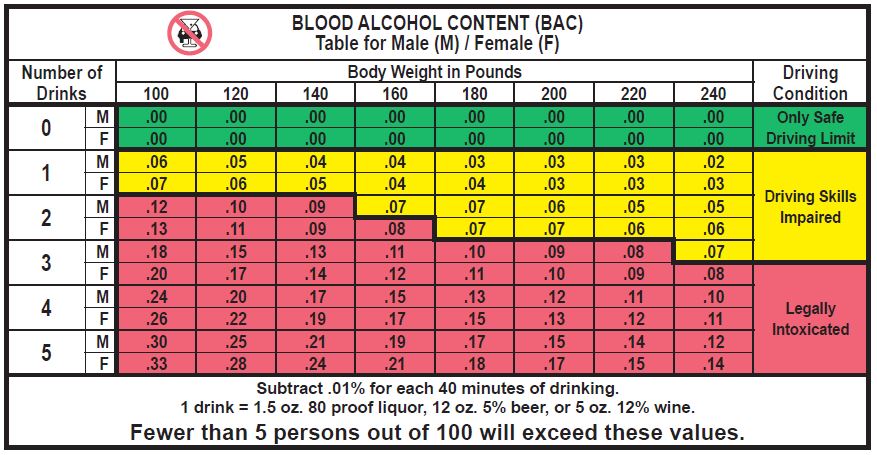
1st offense drinking and driving: For most first time drinking and driving offenders, jail is not likely absent some other aggravating circumstances in the 38th and 39th District Courts. A person without any prior drinking and driving offenses can expect to get an OWI reduced to ‘operating while impaired’. It is extremely difficult and rare, but not impossible, to get a drinking and driving offense reduced to a non-criminal offense. In addition to probation, a person convicted for a first drinking and driving offense (operating while impaired) is looking at:
- Probation for 1 year or less
- Fines and costs approximately $1,200.00
- Restricted license for 90 days
- Attend an alcohol or substance abuse program (discretionary)
- Possible drug testing, alcohol testing, AA meetings (discretionary)
- 4 points on driving record
Super Drunk Driving: If a person is charged with Super DUI (BAC .17 or greater) a deviation may need to be filed to get a plea bargain to a lower offense. Super DUI convictions will result in mandatory license suspension for 45 days followed by a restricted license for a period of 320 days with the requirement of a vehicle breathalyzer ignition interlock device (BAIID). The Court can also order installation of an ignition interlock system on any vehicle driven by a person convicted of any drinking and driving offense, not just a Super DUI.
Repeat DUI Offender: A repeat drinking and driving offender may be looking at a longer period of probation, up to 2 years, with the possibility of some jail time. There are many steps that we can recommend to those charged with a repeat offense to reduce the likelihood of incarceration in almost every Macomb County court.
Third Lifetime DUI = Felony: DUI 3rd is a felony/with a maximum penalty of 1-5 years in prison. Felony matters begin in the district court and can remain in the district court for purpose of sentencing and probation if reduced to a misdemeanor. Felonies that are not resolved in the district court are handled in the Circuit Court after the probable cause conference or preliminary examination. We evaluate every DUI 3rd for opportunities to get it reduced to a misdemeanor by filing strategic legal motions, negotiations and filing a deviation request.
Traffic Violations in the 38th and 39th District Courts: Reduced to Avoid Points and Record of any Conviction!
Several police agencies have an active presence monitoring the activity of vehicular traffic within the jurisdiction of the 38th and 39th District Courts. Like other district courts in Macomb County, I would say that traffic tickets are on the top of the list of types of cases that are litigated at these Courts. When resolving a traffic matter in the 38th and 39th District Courts, we are often able to negotiate a reduction or avoid points. A substantial reduction in a traffic ticket occurs when it is reduced to an offense such as impeding traffic or double parking. A traffic ticket that is reduced to impeding traffic or double parking does not carry any points and will never appear on a person’s driving record! We are also able to get favorable results for individuals charged with misdemeanor traffic offenses such as driving while suspended, reckless driving and leaving the scene of an accident.
Court Personnel are Forbidden to Give Legal Advice: Yet most courts are making it easier than ever to just pay your traffic ticket by visiting the court’s website and giving offenders the convenient option to pay by credit card. What they won’t tell you on their website is that you will get points on your driving record and that you may will wind up with higher insurance premiums for several years. Unfortunately, most individuals that receive a traffic ticket do not hire a lawyer. The path of least resistance, paying the ticket, can be much costlier in the long run.
 Michigan Criminal Lawyer Blog
Michigan Criminal Lawyer Blog












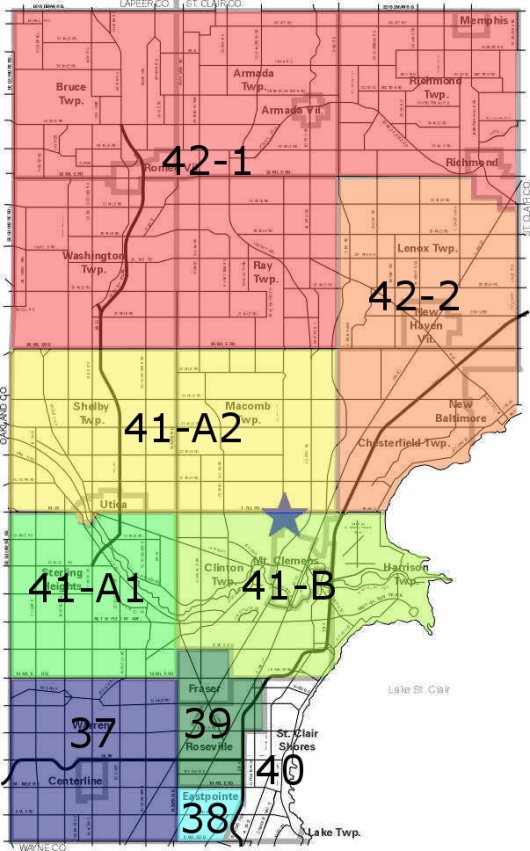

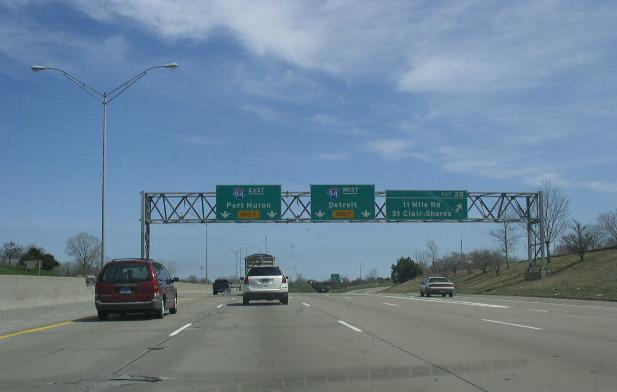
![embarrassed[1].jpg](https://www.michigancriminallawyer-blog.com/files/2015/02/embarrassed1.jpg)


